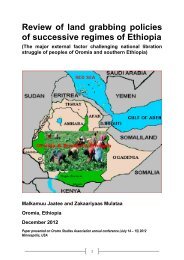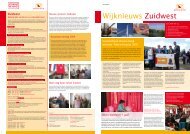freakonomics
freakonomics
freakonomics
You also want an ePaper? Increase the reach of your titles
YUMPU automatically turns print PDFs into web optimized ePapers that Google loves.
“The Peter Sandman Risk Communication Web Site” at http://<br />
www.psandman.com/index.htm.<br />
HOW MUCH DO PARENTS REALLY MATTER? See Judith Rich Harris, The Nurture<br />
Assumption: Why Children Turn Out the Way They Do (New York: Free Press, 1998);<br />
for a Harris profile that also provides an excellent review of the nature-nurture debate,<br />
see Malcolm Gladwell, “Do Parents Matter?” The New Yorker, August 17, 1998; and<br />
Carol Tavris, “Peer Pressure,” New York Times Book Review, September 13, 1998. /<br />
155 “‘Here we go again’”: See Tavris, New York Times. / 155 Pinker called Harris’s<br />
views “mind-boggling”: Steven Pinker, “Sibling Rivalry: Why the Nature/Nurture Debate<br />
Won’t Go Away,” Boston Globe, October 13, 2002, adapted from Steven Pinker, The<br />
Blank Slate: The Modern Denial of Human Nature (New York: Viking, 2002).<br />
SCHOOL CHOICE IN CHICAGO: This material is drawn from Julie Berry Cullen,<br />
Brian Jacob, and Steven D. Levitt, “The Impact of School Choice on Student Outcomes:<br />
An Analysis of the Chicago Public Schools,” Journal of Public Economics, forthcoming;<br />
and Julie Berry Cullen, Brian Jacob, and Steven D. Levitt, “The Effect of School Choice<br />
on Student Outcomes: Evidence from Randomized Lotteries,” National Bureau of<br />
Economic Research working paper, 2003.<br />
STUDENTS WHO ARRIVE AT HIGH SCHOOL NOT PREPARED TO DO HIGH<br />
SCHOOL WORK: See Tamar Lewin, “More Students Passing Regents, but Achievement<br />
Gap Persists,” New York Times, March 18, 2004.<br />
THE BLACK-WHITE INCOME GAP TRACED TO EIGHTH-GRADE TEST SCORE<br />
GAP: See Derek Neal and William R. Johnson, “The Role of Pre-Market Factors in<br />
Black-White Wage Differences,” Journal of Political Economy 104 (1996), pp. 869–95;<br />
and June O’Neill, “The Role of Human Capital in Earnings Differences Between Black<br />
and White Men,” Journal of Economic Perspectives 4, no. 4 (1990), pp. 25–46. / 160<br />
“Reducing the black-white test score gap”: See Christopher Jencks and Meredith Phillips,<br />
“America’s Next Achievement Test: Closing the Black-White Test Score Gap,”<br />
American Prospect 40 (September–October 1998), pp. 44–53.<br />
160 “ACTING WHITE”: See David Austen-Smith and Roland G. Fryer Jr., “The<br />
Economics of ‘Acting White,’” National Bureau of Economic Research working paper,<br />
2003. / 160 Kareem Abdul-Jabbar: Kareem Abdul-Jabbar and Peter Knobler, Giant Steps<br />
(New York: Bantam, 1983), p. 16.<br />
THE BLACK-WHITE TEST SCORE GAP AND THE ECLS: This material was drawn<br />
from Roland G. Fryer Jr. and Steven D. Levitt, “Understanding the Black-White Test<br />
Score Gap in the First Two Years of School,” The Review of Economics and Statistics<br />
86, no. 2 (2004), pp. 447–464. While this paper contains little discussion of the<br />
correlation between test scores and home-based factors (television viewing, spanking,<br />
etc.), a regression of those data is included in the paper’s appendix. Regarding the ECLS<br />
study itself: as of this writing, an overview of the study was posted at nces.ed.gov/ecls/.









